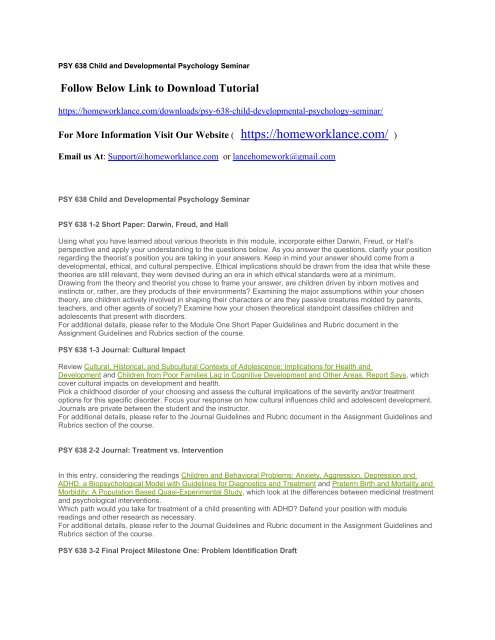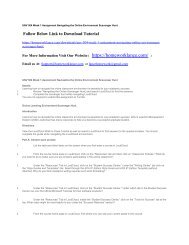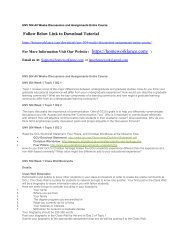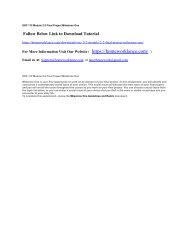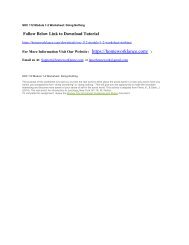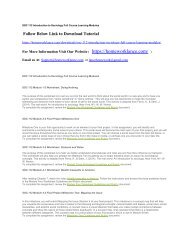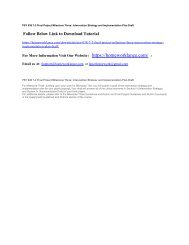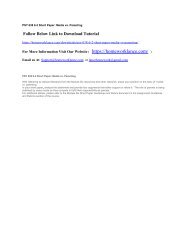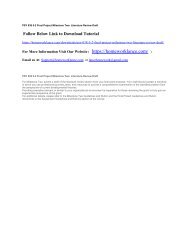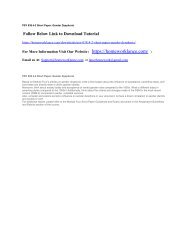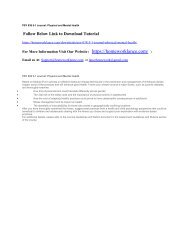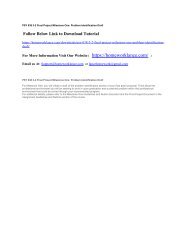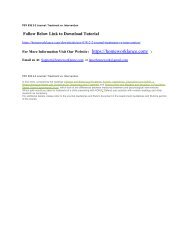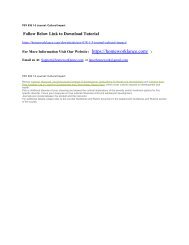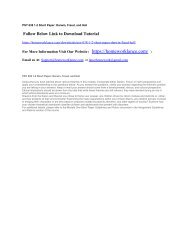PSY 638 Child and Developmental Psychology Seminar
You also want an ePaper? Increase the reach of your titles
YUMPU automatically turns print PDFs into web optimized ePapers that Google loves.
<strong>PSY</strong> <strong>638</strong> <strong>Child</strong> <strong>and</strong> <strong>Developmental</strong> <strong>Psychology</strong> <strong>Seminar</strong><br />
Follow Below Link to Download Tutorial<br />
https://homeworklance.com/downloads/psy-<strong>638</strong>-child-developmental-psychology-seminar/<br />
For More Information Visit Our Website ( https://homeworklance.com/ )<br />
Email us At: Support@homeworklance.com or lancehomework@gmail.com<br />
<strong>PSY</strong> <strong>638</strong> <strong>Child</strong> <strong>and</strong> <strong>Developmental</strong> <strong>Psychology</strong> <strong>Seminar</strong><br />
<strong>PSY</strong> <strong>638</strong> 1-2 Short Paper: Darwin, Freud, <strong>and</strong> Hall<br />
Using what you have learned about various theorists in this module, incorporate either Darwin, Freud, or Hall’s<br />
perspective <strong>and</strong> apply your underst<strong>and</strong>ing to the questions below. As you answer the questions, clarify your position<br />
regarding the theorist’s position you are taking in your answers. Keep in mind your answer should come from a<br />
developmental, ethical, <strong>and</strong> cultural perspective. Ethical implications should be drawn from the idea that while these<br />
theories are still relevant, they were devised during an era in which ethical st<strong>and</strong>ards were at a minimum.<br />
Drawing from the theory <strong>and</strong> theorist you chose to frame your answer, are children driven by inborn motives <strong>and</strong><br />
instincts or, rather, are they products of their environments? Examining the major assumptions within your chosen<br />
theory, are children actively involved in shaping their characters or are they passive creatures molded by parents,<br />
teachers, <strong>and</strong> other agents of society? Examine how your chosen theoretical st<strong>and</strong>point classifies children <strong>and</strong><br />
adolescents that present with disorders.<br />
For additional details, please refer to the Module One Short Paper Guidelines <strong>and</strong> Rubric document in the<br />
Assignment Guidelines <strong>and</strong> Rubrics section of the course.<br />
<strong>PSY</strong> <strong>638</strong> 1-3 Journal: Cultural Impact<br />
Review Cultural, Historical, <strong>and</strong> Subcultural Contexts of Adolescence: Implications for Health <strong>and</strong><br />
Development <strong>and</strong> <strong>Child</strong>ren from Poor Families Lag in Cognitive Development <strong>and</strong> Other Areas, Report Says, which<br />
cover cultural impacts on development <strong>and</strong> health.<br />
Pick a childhood disorder of your choosing <strong>and</strong> assess the cultural implications of the severity <strong>and</strong>/or treatment<br />
options for this specific disorder. Focus your response on how cultural influences child <strong>and</strong> adolescent development.<br />
Journals are private between the student <strong>and</strong> the instructor.<br />
For additional details, please refer to the Journal Guidelines <strong>and</strong> Rubric document in the Assignment Guidelines <strong>and</strong><br />
Rubrics section of the course.<br />
<strong>PSY</strong> <strong>638</strong> 2-2 Journal: Treatment vs. Intervention<br />
In this entry, considering the readings <strong>Child</strong>ren <strong>and</strong> Behavioral Problems: Anxiety, Aggression, Depression <strong>and</strong><br />
ADHD, a Biopsychological Model with Guidelines for Diagnostics <strong>and</strong> Treatment <strong>and</strong> Preterm Birth <strong>and</strong> Mortality <strong>and</strong><br />
Morbidity: A Population Based Quasi-Experimental Study, which look at the differences between medicinal treatment<br />
<strong>and</strong> psychological interventions.<br />
Which path would you take for treatment of a child presenting with ADHD? Defend your position with module<br />
readings <strong>and</strong> other research as necessary.<br />
For additional details, please refer to the Journal Guidelines <strong>and</strong> Rubric document in the Assignment Guidelines <strong>and</strong><br />
Rubrics section of the course.<br />
<strong>PSY</strong> <strong>638</strong> 3-2 Final Project Milestone One: Problem Identification Draft
For Milestone One, you will create a draft of the problem identification section of your final grant proposal. Think<br />
about the professional environment you will be seeking to work in upon graduation <strong>and</strong> a potential problem within that<br />
professional environment that could be solved through your recommended program.<br />
For additional details, please refer to the Milestone One Guidelines <strong>and</strong> Rubric document <strong>and</strong> the Final Project<br />
Document in the Assignment Guidelines <strong>and</strong> Rubrics section of the course.<br />
<strong>PSY</strong> <strong>638</strong> 4-2 Short Paper: Gender Dysphoria<br />
Based on Module Four’s articles on gender dysphoria, write a short paper about the influence of acceptance,<br />
parenting styles, <strong>and</strong> how these can directly steer a child’s gender identity.<br />
Moreover, think about society today <strong>and</strong> acceptance of varied gender roles compared to the 1950s. What is different<br />
today in parenting styles compared to the 1950s? Additionally, think about the criteria <strong>and</strong> changes made in the DSM<br />
in the most recent version (DSM-5) compared to earlier, outdated versions.<br />
Also, consider <strong>and</strong> explore society’s influence on gender dysphoria in your argument. Is there a direct correlation to<br />
gender identity <strong>and</strong> society or not?<br />
For additional details, please refer to the Module Four Short Paper Guidelines <strong>and</strong> Rubric document in the<br />
Assignment Guidelines <strong>and</strong> Rubrics section of the course.<br />
<strong>PSY</strong> <strong>638</strong> 5-1 Journal: Physical <strong>and</strong> Mental Health<br />
<br />
<br />
<br />
<br />
<br />
Based on Module Five’s articles on effective behavior change techniques in the prevention <strong>and</strong> management of<br />
childhood obesity, explain some of the practices that will enhance good health. Frame your answer around a major<br />
illness, such as juvenile diabetes, <strong>and</strong> thoroughly examine:<br />
How this physical ailment could translate differently across gender<br />
The vital role of the sleep cycle <strong>and</strong> the importance of physical activity in adolescents<br />
How the void of adapting healthy practices could prove to have catastrophic consequences in adulthood<br />
Stress management <strong>and</strong> its impact on health<br />
The downfalls of inaccessibility for those who reside in geographically confining locations<br />
After you have thoroughly examined the illness, suggest best practices from a health <strong>and</strong> child psychology<br />
perspective that could be beneficial to children <strong>and</strong> adolescents dealing with the illness you chose <strong>and</strong> support your<br />
explanation with evidence-based practices.<br />
For additional details, please refer to the Journal Guidelines <strong>and</strong> Rubric document in the Assignment Guidelines <strong>and</strong><br />
Rubrics section of the course.<br />
<strong>PSY</strong> <strong>638</strong> 5-2 Final Project Milestone Two: Literature Review Draft<br />
For Milestone Two, submit a draft of the literature review section from your final grant proposal. Your draft should<br />
contain a narrative in which you use professional journals, texts, <strong>and</strong> resources to provide a comprehensive<br />
examination of the identified problem from the perspective of current developmental theories.<br />
Providing examples relevant or similar to your organizational environment is imperative for those reviewing the grant<br />
to truly gain an experiential perspective of the grant.<br />
For additional details, please refer to the Milestone Two Guidelines <strong>and</strong> Rubric <strong>and</strong> the Final Project Guidelines <strong>and</strong><br />
Rubric documents in the Assignment Guidelines <strong>and</strong> Rubrics section of the course.<br />
<strong>PSY</strong> <strong>638</strong> 6-2 Short Paper: Media vs. Parenting<br />
With reference to relevant literature from the Module Six resources <strong>and</strong> other research, argue your position on the<br />
topic of “media vs. parenting.”<br />
In your short paper, analyze this statement <strong>and</strong> provide four arguments that either support or refute it: “The role of<br />
parents is being sidelined by mass media as they compete to fulfill their responsibility as parents.”<br />
For additional details, please refer to the Module Six Short Paper Guidelines <strong>and</strong> Rubric document in the Assignment<br />
Guidelines <strong>and</strong> Rubrics section of the course.
<strong>PSY</strong> <strong>638</strong> 7-2 Final Project Milestone Three: Intervention Strategy <strong>and</strong> Implementation Plan Draft<br />
For Milestone Three, building upon your work for Milestone Two, you will submit a draft of the intervention strategy<br />
<strong>and</strong> implementation plan for your grant proposal. Your draft will answer all of the critical elements in Section III<br />
(Intervention Strategy) <strong>and</strong> Section IV (Implementation Draft) of your final project.<br />
For additional details, please refer to the Milestone Three Guidelines <strong>and</strong> Rubric <strong>and</strong> Final Project Guidelines <strong>and</strong><br />
Rubric documents in the Assignment Guidelines <strong>and</strong> Rubrics section of the course.


